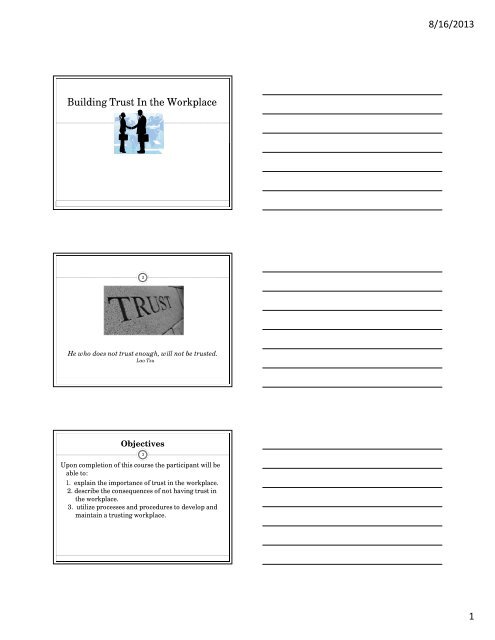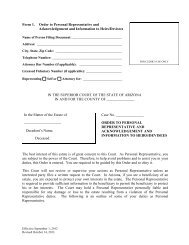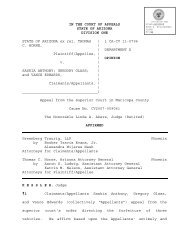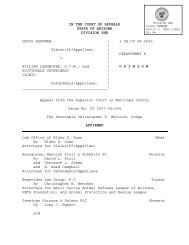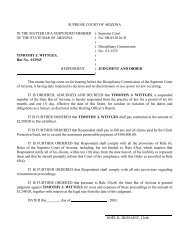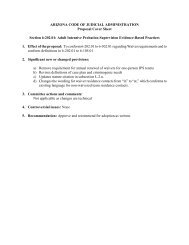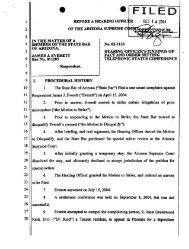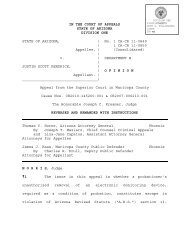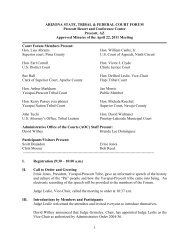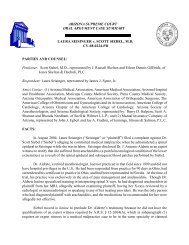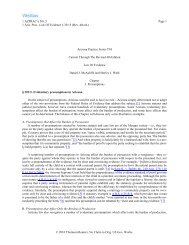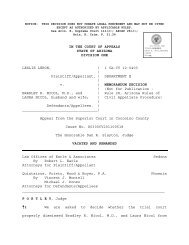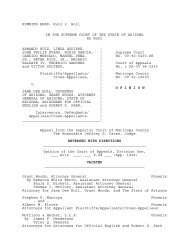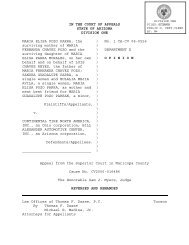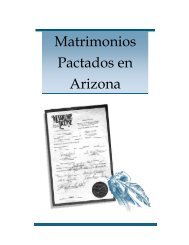Building Trust PowerPoint Slides
Building Trust PowerPoint Slides
Building Trust PowerPoint Slides
You also want an ePaper? Increase the reach of your titles
YUMPU automatically turns print PDFs into web optimized ePapers that Google loves.
8/16/2013<br />
<strong>Building</strong> <strong>Trust</strong> In the Workplace<br />
1<br />
2<br />
He who does not trust enough, will not be trusted.<br />
Lao Tzu<br />
Objectives<br />
Upon completion of this course the participant will be<br />
able to:<br />
1. explain the importance of trust in the workplace.<br />
2. describe the consequences of not having trust in<br />
the workplace.<br />
3. utilize processes and procedures to develop and<br />
maintain a trusting workplace.<br />
3<br />
1
8/16/2013<br />
• Rule for This Class:<br />
<strong>Building</strong> <strong>Trust</strong><br />
<strong>Trust</strong> means: feeling safe, having confidence<br />
that failures will not be mocked, attempts<br />
will be cheered, and successes will be<br />
celebrated and that others will accept you<br />
and your contributions.<br />
4<br />
What is <strong>Trust</strong>?<br />
5<br />
• <strong>Trust</strong>, noun: a : assured reliance on the character,<br />
ability, strength, or truth of someone or something.<br />
b : one in which confidence is placed<br />
• <strong>Trust</strong>, verb: a : to place confidence: depend. b : to<br />
commit or place in one's care or keeping : entrust<br />
--Merriam-Webster Online Dictionary 2013<br />
<strong>Building</strong> <strong>Trust</strong> Activity<br />
1. Where did you grow up?<br />
2. How many siblings do you have and<br />
where do you fall in the sibling<br />
order (oldest, youngest, middle)?<br />
3. What was the most difficult,<br />
important or unique challenge of<br />
your childhood?<br />
6<br />
2
8/16/2013<br />
Who do you trust?<br />
7<br />
Why?<br />
Who trusts you?<br />
Why is trust important?<br />
8<br />
Basic Human Need<br />
Foundation of Relationships<br />
Organizational Need<br />
Creates Effective Communication/Cooperation<br />
Retains Employees<br />
Motivates Employees<br />
Allows for Risk Taking<br />
<strong>Trust</strong> and Communication<br />
9<br />
<strong>Trust</strong><br />
Communication<br />
3
8/16/2013<br />
Why is trust important?<br />
10<br />
<strong>Trust</strong> is necessary for:<br />
• feeling able to rely upon a coworker.<br />
• cooperating with and experiencing teamwork with<br />
a group.<br />
• taking thoughtful risks.<br />
• experiencing believable communication.<br />
How is trust built/created?<br />
11<br />
It takes years to build trust and only seconds to destroy it.<br />
anon<br />
Characteristics that build/create trust .<br />
12<br />
Competence/Credibility<br />
Dependability/Consistency<br />
Honesty/Reputation<br />
Consideration<br />
Contribution<br />
4
8/16/2013<br />
Workplace activities that promote trust.<br />
13<br />
Promoting Fairness<br />
Holding Social Events<br />
Celebrating team success.<br />
What are the consequences of NOT<br />
having trust in workplace?<br />
14<br />
Workplace Culture<br />
High <strong>Trust</strong> Low <strong>Trust</strong><br />
Willingness to<br />
Understand<br />
Others<br />
Benefit of the<br />
Doubt<br />
Good Morale<br />
Positive<br />
Relationships<br />
Suspicion of Other’s<br />
Motives<br />
Assume the Worst<br />
Low Morale<br />
Poor Relationships<br />
What destroys trust?<br />
15<br />
Act and speak inconsistently.<br />
Seek personal rather than shared<br />
gain.<br />
Withhold information.<br />
Lie or tell half truths.<br />
Be closed minded.<br />
5
8/16/2013<br />
What destroys trust?<br />
16<br />
Keep<br />
Secrets<br />
Don’t<br />
Admit<br />
Mistakes<br />
Fail to<br />
Deliver on<br />
Promises<br />
Double<br />
Talk<br />
5 Dysfunctions of a Team<br />
17<br />
Source:<br />
Patrick Lencioni,<br />
The Five Dysfunctions of a Team<br />
Inattention to<br />
RESULTS<br />
Avoidance of<br />
ACCOUNTABILTY<br />
Lack of<br />
COMMITTMENT<br />
Fear of<br />
CONFLICT<br />
Absence of<br />
TRUST<br />
Betrayal<br />
• Name some ways in which you can “betray” a<br />
person’s trust.<br />
18<br />
6
8/16/2013<br />
Activity: Betrayal<br />
19<br />
Talking. How can you conduct a difficult conversation<br />
with a person who broke your trust?<br />
Analyzing. How can you calmly analyze the betrayal<br />
incident?<br />
Decision making. How should you interact with each<br />
other in the future?<br />
Forgiving. How can you forgive and forget the other<br />
person's behavior—and your own behavior?<br />
Reprinted from THIAGI GAMELETTER. Copyright © 2012<br />
by The Thiagi Group, Inc.<br />
Rebuilding <strong>Trust</strong><br />
20<br />
Rebuild Your <strong>Trust</strong> in Yourself<br />
Admit the Wrong<br />
Apologize for the Wrong<br />
Make Restitution for the Wrong<br />
Re-do<br />
(the things that earned the trust in the first place)<br />
21<br />
You May Never Overcome Some<br />
You May Never Overcome Some<br />
Betrayals.<br />
7
8/16/2013<br />
<strong>Trust</strong><br />
22<br />
Key leadership competency<br />
The glue that holds all relationships together—including<br />
the relationship between leaders and the led is trust and<br />
trust is based on integrity. --Brian Tracey<br />
<strong>Trust</strong> and Leadership<br />
23<br />
Factors that lead to employees<br />
seeking new jobs:<br />
Loss of <strong>Trust</strong> in Company<br />
Lack of Transparency by Leadership<br />
Perception of Unethical and Unfair<br />
Treatment<br />
<strong>Trust</strong> in the Workplace<br />
2010 Ethics and Workplace Survey<br />
--Deloitte LLP 2010<br />
Maintaining <strong>Trust</strong><br />
24<br />
The best way to maintain a trusting work<br />
environment is to keep from breaking<br />
trust in the first place.<br />
8
8/16/2013<br />
Suggested Reading<br />
25<br />
• The Speed of <strong>Trust</strong>, Stephen M. R. Covey, Free Press,<br />
2006.<br />
• <strong>Trust</strong> and Betrayal in the Workplace, Reina and<br />
Reina, Berrett-Koehler Publishers, 2006.<br />
• <strong>Trust</strong> Rules: How to Tell the Good Guys From the<br />
Bad Guys in Work and in Life, Linda K. Stroh, PhD.,<br />
Praeger Publishers, 2007.<br />
References<br />
Heathfield, Susan M., <strong>Trust</strong> Rules: The Most Important<br />
Secret About <strong>Trust</strong> What Is <strong>Trust</strong>?, About.com Guide,<br />
2012.<br />
Reina, Reina, Chagnon, Reina and Reina, <strong>Trust</strong> and<br />
Betrayal in the Workplace, Berrett-Koehler Publishers,<br />
2006.<br />
Tway, Duane C., A Construct of <strong>Trust</strong>, Dissertation, 1993.<br />
Unpublished Paper, Leadership and <strong>Trust</strong>: An<br />
Imperative for the Transition Decade and Beyond, 1995.<br />
Covey, Stephen, M. R., The Speed of <strong>Trust</strong>, Free Press,<br />
2006.<br />
26<br />
9


